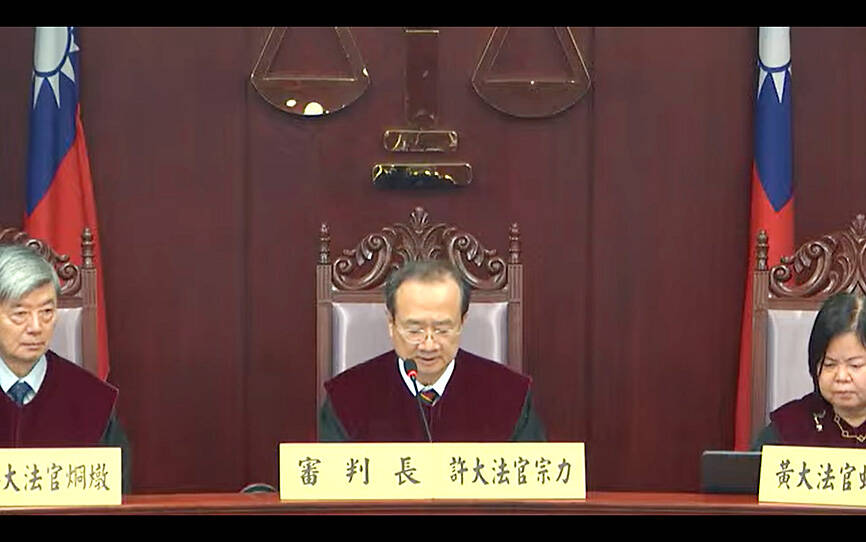The Constitutional Court on Friday upheld the constitutionality of legal provisions used to punish people who have changed their household registration to vote where they did not live, work or study.
The grand justices found the three provisions under Article 146 of the Criminal Code to be constitutional, because what constitutes illegality is clearly defined and does not infringe on people’s rights to equality, vote and move freely as enshrined in the Constitution.
The punishment is also proportional, Chief Justice Hsu Tzong-li (許宗力) said.

Photo: Wu Cheng-feng, Taipei Times
Article 146 states that a person who illegally intervenes in voting or falsifies voting results, fraudulently changes their household registration to be eligible to vote in a different constituency or attempts to commit such offenses, faces up to five years in prison.
Taiwan’s voting laws are tethered to the household registration system, whereby citizens have to register their primary abode with the government. Eligible voters then have to cast their ballot at a polling booth in an electoral district where they have been registered for a minimum of four consecutive months prior to an election.
Twenty people found guilty of offenses under the article in five elections that took place from 2006 to 2018 asked the grand justices to rule on the constitutionality of the provisions, citing the constitutional right to vote and freedom to choose a residence, among other reasons.
One of the 20, a resident of then-Taipei County (now New Taipei City), surnamed Hu (胡), registered as living in Hualien in February 2006, enabling him to cast a ballot for his uncle who was running for village warden in June that year. He moved his household registration back to Taipei County after the election, and was chargedwith voting interference.
The Hualien District Court sentenced Hu to two months in jail, which could be converted to a fine and one year of deprivation of civil rights. The ruling was later upheld by the High Court in the final verdict.
In another case, Liu Huei-tsung (劉惠宗) and the other two members of China Airlines’ labor union were found guilty of moving their household registrations in Taipei to Taoyuan in July 2018, so that they could vote for their colleague in the Taoyuan mayoral election in November that year.
They each received a three-month sentence, which could be converted to a fine, two-years probation and deprivation of civil rights for one year. The Supreme Court upheld that ruling.
Despite ruling in favor of the constitutionality of Article 146, which the trio were found to have breached, the Constitutional Court ordered a retrial at the Supreme Court, saying that it failed to take into account that the union members had commuted to work in Taoyuan for 20 to 30 years, despite all living in Taipei.
Taiwanese can choose their place of residence or work for household registration, and given that the three union members met the four-month threshold to vote in the Taoyuan mayoral election after they registered households in the city, the Supreme Court’s ruling was tantamount to an infringement of their right to vote, the Constitutional Court said.

Chinese spouse and influencer Guan Guan’s (關關) residency permit has been revoked for repeatedly posting pro-China videos that threaten national security, the National Immigration Agency confirmed today. Guan Guan has said many controversial statements in her videos posted to Douyin (抖音), including “the red flag will soon be painted all over Taiwan” and “Taiwan is an inseparable part of China,” and expressing hope for expedited reunification. The agency last year received multiple reports alleging that Guan Guan had advocated for armed reunification. After verifying the reports, the agency last month issued a notice requiring her to appear and explain her actions. Guan

GIVE AND TAKE: Blood demand continues to rise each year, while fewer young donors are available due to the nation’s falling birthrate, a doctor said Blood donors can redeem points earned from donations to obtain limited edition Formosan black bear travel mugs, the Kaohsiung Blood Center said yesterday, as it announced a goal of stocking 20,000 units of blood prior to the Lunar New Year. The last month of the lunar year is National Blood Donation Month, when local centers seek to stockpile blood for use during the Lunar New Year holiday. The blood demand in southern Taiwan — including Tainan and Kaohsiung, as well as Chiayi, Pingtung, Penghu and Taitung counties — is about 2,000 units per day, the center said. The donation campaign aims to boost

The Kaohsiung Tourism Bureau audited six hotels in an effort to prevent price gouging ahead of Korean band BTS’ concert tour in the city scheduled for Nov. 19, 21 and 22 this year. The bureau on Friday said that the audits — conducted in response to allegations of unfair pricing posted on social media — found no wrongdoing. These establishments included the local branches of Chateau de Chine, Hotel Nikko, My Humble House, and Grand Hai Lai, it said, adding that the Consumer Protection Commission would have penalized price gougers had the accusations been substantiated. The bureau said the Tourism Development Act

The Central Weather Administration (CWA) said a magnitude 4.9 earthquake that struck off the coast of eastern Taiwan yesterday was an independent event and part of a stress-adjustment process. The earthquake occurred at 4:47pm, with its epicenter at sea about 45.4km south of Yilan County Hall at a depth of 5.9km, the CWA said. The quake's intensity, which gauges the actual effects of a temblor, was highest in several townships in Yilan and neighboring Hualien County, where it measured 4 on Taiwan's seven-tier intensity scale, the CWA said. Lin Po-yu (林柏佑), a division chief at the CWA's Seismological Center, told a news conference